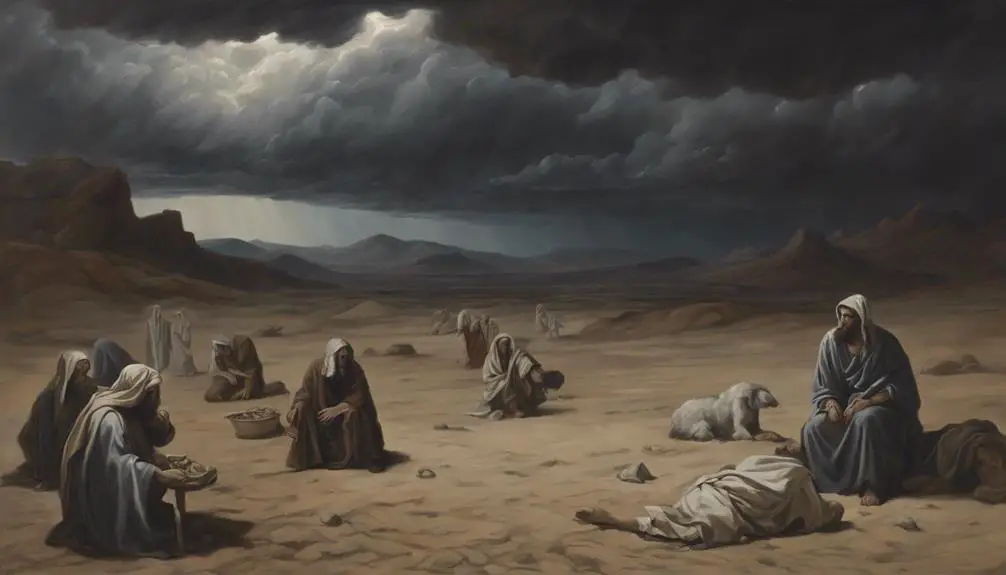Plunge into the raw, human desperation in the Bible, and uncover profound narratives of characters like Job and Elijah.

Examples of Desperation in the Bible
Did you know that over 2,000 times, the Bible shows us humans in their rawest forms – hopelessness, fear, and desperation?
As you explore these instances, you'll encounter characters like Job, whose despair was so deep he cursed his own birth; or consider Elijah, a prophet, who in a moment of fear and desperation, fled for his life.
This is only scratching the surface. Imagine, then, what other profound narratives of desperation await your discovery.
Elijah's Fear and Flee: A Prophetic Desperation

Diving into the narrative, you'll find Elijah's journey marked by a profound desperation, particularly evident when he succumbs to prophetic fear and flees for his life after a prophetic confrontation. This flight response, catalyzed by his dread of Queen Jezebel's threats, underscores the depth of his terror. Significantly, this occurs right after his triumphant showdown at Mount Carmel, highlighting the stark contrast in his emotional state.
Analyzing this event, you'll notice that Elijah's fear isn't irrational or baseless. He's fully aware of the danger he's in, understanding the deadly implications of Jezebel's wrath. This prophetic fear isn't merely a passive emotion; it propels Elijah into action, triggering his flight response. He doesn't just cower in anxiety; he decisively acts on his fear, demonstrating a survival instinct that's deeply human.
However, Elijah's flight also signifies his momentary loss of faith. Despite having witnessed God's power at Mount Carmel, he allows his fear to overrule his trust in divine protection. So, it's not just about physical survival; it's also about spiritual struggle, underscoring the nuanced nature of his desperation. Elijah's story, thus, presents a complex interplay of fear, faith, and desperation.
Job's Curse: The Depth of Despair

Shifting our focus from Elijah's fear-fueled flight, we encounter another biblical figure, Job, whose despair plunges even deeper, painting a picture of desperation that's starkly different yet equally compelling. Job's suffering was profound, losing all he held dear: his children, his wealth, and even his health. Yet, despite the depth of his despair, Job's story isn't merely one of suffering but also of persistence through despair.
You see, Job's desperation wasn't a fleeting moment but a relentless, gut-wrenching experience. He cursed the day of his birth, wishing he'd never been born. His pain was such that he wished to die, to end his suffering. Yet, in his most desperate moments, Job didn't abandon his faith. He questioned, he lamented, but he held fast to his belief.
Your understanding of Job's desperation deepens when you consider his unwavering endurance. Despite his profound suffering, Job showed persistence through despair, wrestling with his faith but never letting go. His story is a testament to human resilience in the face of overwhelming adversity. In the depths of his despair, Job's faith remained, a beacon of hope in the darkest of times.
Jonah in the Whale: Reluctance and Desperation

Turning our attention to the story of Jonah, you encounter a unique blend of reluctance and desperation, manifesting in his attempt to evade God's orders, only to find himself in the belly of a whale. At the heart of this narrative is Jonah's rebellion, a willful disobedience that sets the stage for his subsequent desperation.
Jonah's reluctance to follow God's command to preach to the city of Nineveh was fueled by fear and prejudice. He tried to escape from the responsibility, thus distancing himself from God's will. This act of rebellion, however, led him to a desperate situation – being swallowed by a whale.
The whale's significance in this story is immense. It stands as a symbol of punishment, but also redemption. In the belly of the whale, Jonah's desperation sinks in. He's cut off from the world, trapped, and helpless. Yet, it's in this extreme situation that he realizes his mistake and repents.
This story underscores the consequences of reluctance and rebellion against divine orders. It also highlights the transformative power of desperation, leading to repentance and redemption even in the most dire circumstances.
Judas Iscariot's Betrayal: Desperation's Dark Side

In examining the dark underbelly of desperation, there's perhaps no more poignant illustration than the betrayal by Judas Iscariot, whose act of treachery against Jesus Christ has been etched into biblical history. Scrutinizing this through the lens of Betrayal Psychology, you can discern the complex interplay of emotions, motivations, and circumstances that led to this catastrophic decision.
Judas's motivation remains a topic of enduring speculation. Some biblical scholars suggest avarice, while others opine political disillusionment. However, beneath these surface explanations, desperation lurks, fuelling his actions. The money he received – thirty pieces of silver – can be seen as a desperate attempt to gain tangible security in a turbulent time.
Similarly, his political disappointment with Jesus, who didn't fulfill expectations of a militant messiah, may have pushed him to desperate measures, hoping to force a change. It's a chilling reminder of how desperation, when left unchecked, can warp judgment and lead to unimaginably destructive choices.
In Judas's story, you see desperation's dark side, a stark warning of how despair can drive one to betray even the closest of relationships. It challenges you to reflect upon your own lives, to check the seeds of desperation before they yield bitter fruit.
King David's Plea: Desperation in Prayer

While Judas' story exposes the treacherous potential of desperation, King David's plea showcases a contrasting aspect: the profound desperation reflected in prayer. David's case is a poignant example of how desperation can drive us to a sincere, humble, and transformative relationship with God. Faced with the enormity of his sins, David's repentance was marked by a prayerful desperation that led him to seek God's mercy and forgiveness.
David's repentance and prayerful desperation are vividly revealed in the following ways:
- His raw honesty: David didn't try to hide or justify his sins. He acknowledged them openly before God.
- His heartfelt sorrow: His remorse wasn't superficial. His desperation was born out of a genuine sorrow for his failures.
- His sincere desire for change: David didn't just want God's forgiveness. He yearned for a clean heart and a renewed spirit.
- His trust in God's mercy: Despite his deep guilt, David had faith in God's ability and willingness to cleanse and restore him.
David's plea, soaked in desperation, is a reminder that even in our deepest despair, there's hope. It's through admitting our weakness and acknowledging our dependency on God that we find divine strength and restoration.
Conclusion
The Bible's tales of desperation, from Elijah's flight to Judas's betrayal, illuminate human frailty and the depths to which we can sink when pushed to our limits. But they also offer the promise of redemption, a testament to the transformative power of faith.
It's a gripping reminder that even in our darkest moments, we're never really alone. The Bible, then, isn't just a book of faith, but also a mirror reflecting our shared human experience.



Sign up